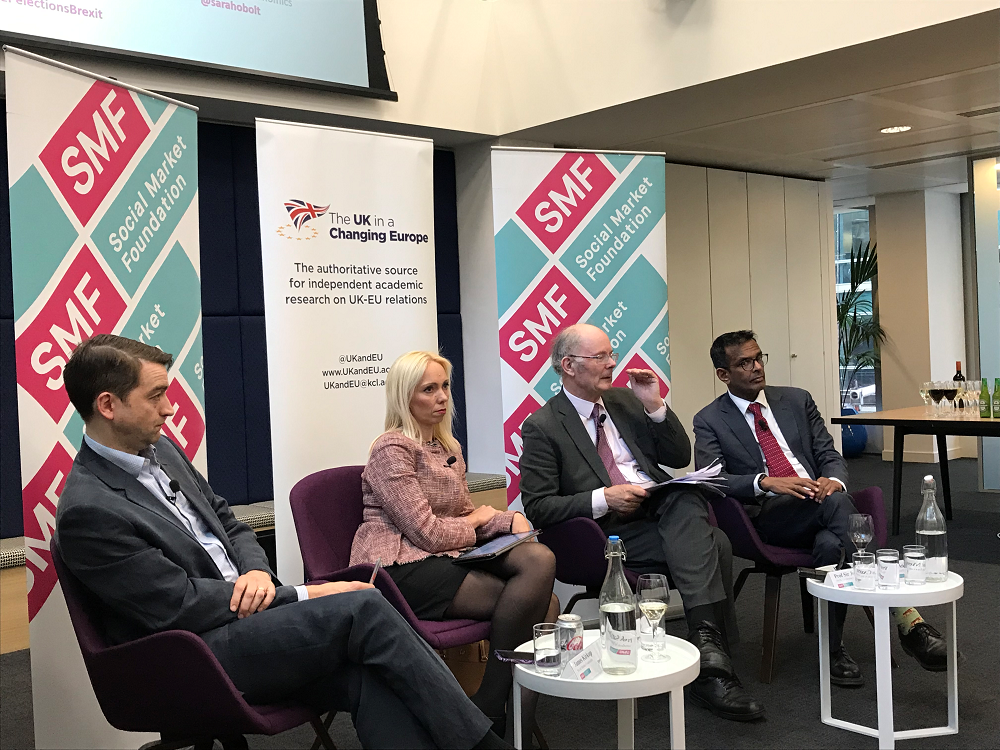The SMF is proud to have a strong partnership with the Economic and Social Research Council, working with ESRC-funded academics from many institutions to help ensure their work has real impact on the world beyond academia, especially among policymakers around Westminster.
On the eve of the 2019 European Parliament elections, we jointly staged a panel debate with the ESCR-funded UK in a Changing Europe initiative, which brings to bear academic expertise from several disciplines to make sense of Brexit and the evolving relationship between the UK and the EU.
The panellists were Professor Anand Menon, Director of UK in a Changing Europe, Professor Sara Hobolt of the LSE, and Professor Sir John Curtice of Strathclyde University. The session was chaired by James Kirkup, SMF Director and a former Fleet Street political editor.
You can watch the video of the whole event here: bit.ly/JohnCurticeFutureofBrexit

These are some of the key points from a discussion among the panellists about the prospects for the British government and its handling of Brexit over the remainder of 2019.
The starting premise for that discussion was that Theresa May is shortly replaced by a new Conservative prime minister. How would that PM approach Brexit?
John Curtice argued that there is little chance of any Tory PM delivering on a promise to leave the EU with no deal on the current exit date of 31st October. Parliament would not allow it, he said – there would be enough Conservative MPs willing to back a no-confidence motion in the government of the day for that motion to pass.
In effect, any PM who pushed for no-deal would see their government collapse in the autumn and risk a general election where there would be a significant chance that Labour would end up in government before the end of the year.
However, Curtice suggested such a Labour government would very likely lack a Commons majority, not least since Labour would win very few seats in Scotland and have to make agreements with the SNP and perhaps the Lib Dems.
That might well leave Jeremy Corbyn head of a majority government dependent on a non-English party and trying to deliver Brexit in the face of a hung parliament. In other words, repeating much of Theresa May’s experience with the DUP- though perhaps with the added challenge of a new Scottish independence referendum, the possible SNP price for support. Curtice’s advice for Labour politicians who say they want a general election soon? “Be careful what you wish for.”
So if a new Conservative PM cannot deliver No Deal without collapsing their government, what would their options be?
Anand Menon said that of the all the potential Conservative PMs, Boris Johnson is most capable of significant changes in his position on Brexit. Even if he’s said he would be happy to leave with no deal, Johnson might well accept the parliamentary arithmetic was against such an outcome and seek an alternative way forward. That could well include a second referendum on Brexit, Menon said. Such a referendum, he suggested, would effectively offer a repackaged version of May’s withdrawal agreement as the “Leave” option and campaign for it.
How would the EU respond to changes on the British side of the Brexit process? Sara Hobolt said that EU trust in Britain to deliver on its assurances is now very low and would likely be reduced further if Johnson became PM, though she cautioned against reading too much in to questions of leaders’ personal relationships with one another.
Overall, the EU would be very reluctant to grant further extensions on the exit date for Britain to make further attempts to pass the May deal through Parliament; the withdrawal agreement as it stands today is very, very unlikely to change substantially. However, the EU27 would probably be willing to extend the deadline to accommodate a new UK referendum, or a UK general election.
Hobolt noted that the EU’s overall strategic objective for Brexit has changed in the last two years. Having once sought to keep the UK in the EU, the EU is now inclined to define the optimum outcome as Britain leaving in an orderly fashion. She also noted that the UK’s domestic politics are mirrored in wider EU politics, where populist parties and politicians (Matteo Salvini of Italy, Viktor Orban of Hungary) are pitted against more traditional centrists backing a more unified EU and led by Emmanuel Macron of France.
The balance of power between those two groups, revealed in the European Parliament results, could affect the Brexit process, not least since it will help determine who becomes the next European Commission president. If the job goes to Michel Barnier of France – who has served as lead Brexit negotiator for the EU – there is little chance of significant change in the EU position on Brexit.
Asked to make predictions for where Britain would stand at the end of 2019, Anand Menon forecast that Boris Johnson will be prime minister and that Britain will still be a member of the EU, having once again agreed to delay its exit. He also predicted a UK general election in early months of 2020.
Sara Hobolt cautioned that the chance of a no deal exit in October is not trivial, and is higher than many political commentators and participants currently assume. The chance of an “accidental” British exit in October is very real, she suggested, though she – prudently – preferred not to offer exact probabilities.
